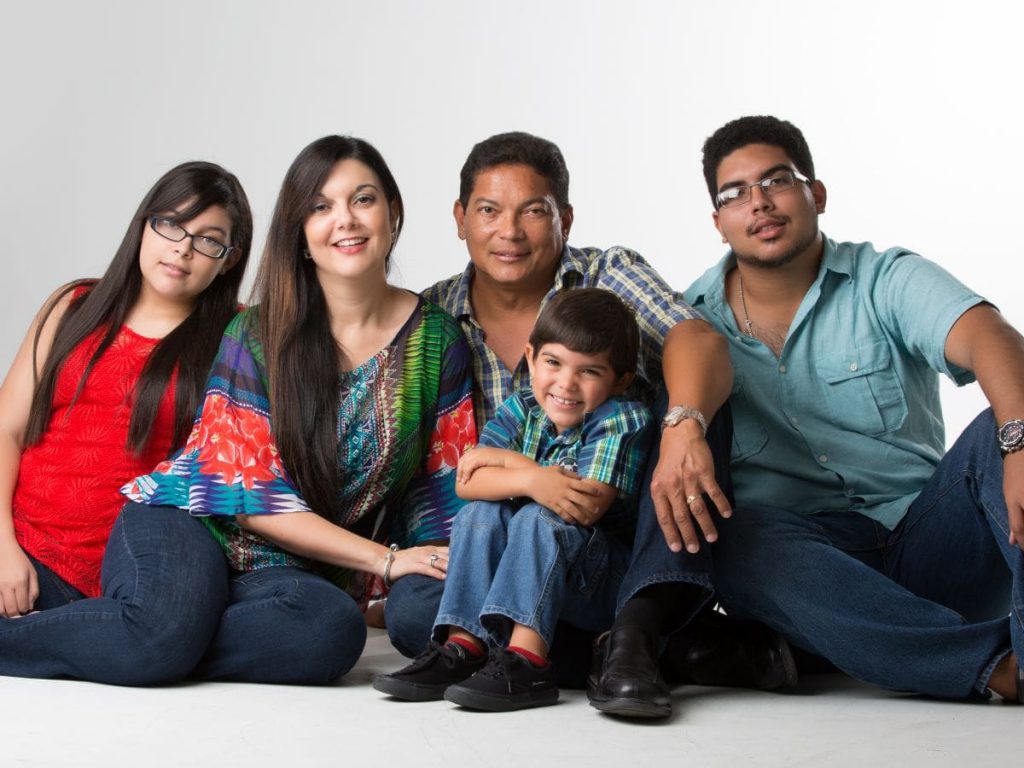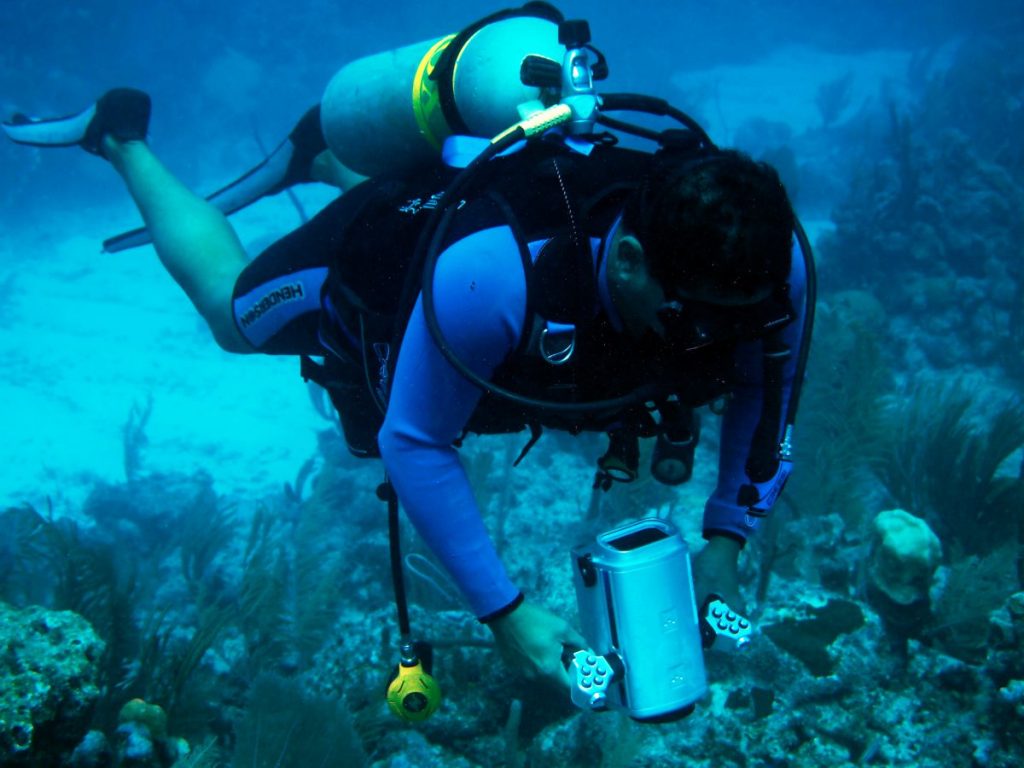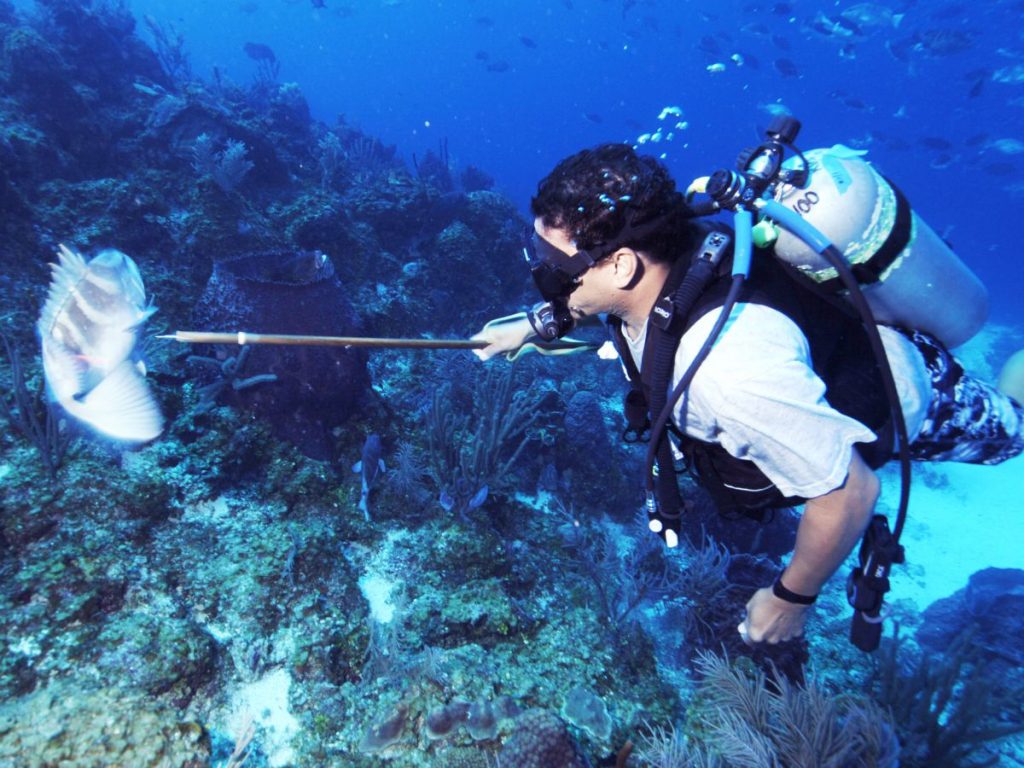Up close with: Croy McCoy
(CNS Local Life): Croy McCoy (51) is truly a man of the sea. Born on Cayman Brac, with summers spent at his father’s dive business, Sam McCoy’s Diving and Fishing Lodge, on Little Cayman (where he eventually moved to work in 1984) he learned to scuba dive at 9 years old. Since then he has logged more than 10,000 hours underwater during four decades of diving throughout the Cayman Islands.
His love of the ocean gradually morphed into an academic and professional interest, leading to a career at the Department of Environment (DoE), which he joined in 1995 and is now a senior research officer in the Marine Resource Unit, and the rare accomplishment of earning a PhD, officially conferred this past December, joining the select 5% of people worldwide who can claim that achievement. His research and efforts were instrumental in the recent Cabinet approval to expand Cayman’s marine protected areas. Despite his impressive achievements, and though he has earned the title ‘doctor’, the unassuming marine biologist would rather be known as Croy.
He worked six years on his PhD, studying part-time at the University of Bangor in Wales, working full-time at DoE and balancing his family life with wife, Yolanda, who he married on New Year’s Day 1993, and their three children, Arren (23), Arianna (16) and Arion (8). If that weren’t enough, he also has a commercial pilot’s licence (and Yolanda has earned her private pilot’s licence). Somehow, he found the time to talk to CNS about his life so far.
CNS: Why did you decide to work toward a PhD?
Croy McCoy: I felt it would equip me with the capacity to do more for my country and my people. Activities that involve the ocean are deep rooted in Caymanian society. I want to make sure those cultural traditions continue, whilst at the same time managing the resources in a responsible and sustainable way.
I would be very disappointed in myself if I look back when I am older and do not see the vibrant and healthy coral reefs I grew up with, knowing I/we could have made that difference to ensure that generations following behind my generation enjoy them as much as we did.
Tourism is one of the economic pillars of my country; healthy coral reefs drive that. Having said that, it is incumbent of me to be always steadfast to put the best management ideas forward and strike a balance between resource users and proper meaningful management of our marine resources.
CNS: What were the logistics of this undertaking considering all the pulls on your time?
CM: The process was overwhelming, to say the least. I have always loved academics as I like to challenge myself and keep my brain engaged. I was encouraged by individuals who taught at academic institutions to pursue my dream of joining the ‘5% club’. My studies were a mix of attending the school in Bangor if I needed to take specific courses and meet with my academic advisor, and doing my independent research in Cayman plus a lot of reading. Between my research and my full-time job, it was exhausting. Sometimes I would work until 3 or 4am on my research and still get up at 7am to take the kids to school.
Two people who gave me unwavering support were my mother and Yolanda’s dad. He would call me every other day; he had a soft way of asking how I was doing and encouraging me. But both passed away before I finished.

CNS: How did you finance your studies?
CM: Doing a PhD is not cheap. My graduate school supervisor and mentor, Professor John Turner (dean of post-graduate research at the School of Ocean Sciences of Bangor University), came up with a brilliant idea: to apply for a Darwin Initiative Grant to take a holistic view of our marine protected area system which had become obsolete. We would study its performance in reference to how our marine park system objectives were being met over a period of time, then make suggestions based on the assessment to enhance and improve our network of marine reserves here in the Cayman Islands.
With academic scholarship funding from the Cayman Islands government to pay part-time PhD enrolment tuition, funding from the grant to do the field work and the in-depth research required it was a perfect match.
CNS: Now that you have earned your PhD, what does that mean for your professionally?
CM: An in-depth understanding of marine ecological systems and the complexities within those systems. It has given me much broader understanding of issues facing coral reefs globally, regionally and locally. I have become a stronger intellect by networking with other academic institutions and interacting with fellow scientists.
Most of all, I feel more equipped to contribute to my country in solving problems/giving sound advice in my area of discipline that otherwise would have to be sourced externally. I have spent the better part of my life (more than 20 years) studying the reefs across the three Cayman Islands, which combined with now a doctorate degree in ocean sciences, gives me the ability to comment from a biological and ecological point of view on current topical marine environmental issues facing my country. It also gives me regional and global recognition.
It is my hope that the Cayman government will embrace my skill sets acquired in the process of doing my PhD, challenge my work capacity and utilise my expertise to help resolve or mitigate current marine environmental issues facing our country.

CNS: What has it meant to you personally?
CM: In the beginning, coming from Little Cayman where the population was 50 when I was there to attending the University of Tampa as an undergrad, it was a real culture shock. Looking back, I don’t know how I did it. My only comfort was I had Yolanda there (she also studied at the University of Tampa).
(In earning the PhD) I must admit, in the back of my head, was the thought that it would make a difference to other young kids of the Sister islands to realise the fact that though we all came from humble beginnings and from a very small island, anything is possible if you are ambitious, determined and willing to make the sacrifices required. My thoughts were it also set a good example to my kids and the Caymanian community as a whole. I would be an encouragement and a catalyst to other Caymanians to seek a higher education and make a difference in their society.
CNS: What do you do for fun?
CM: I come from a family that loves recreational flying (two brothers also have their private pilot’s licence). I attended flight school whilst studying for my undergraduate degree at the University of Tampa in 1993, attaining my private pilot’s licence also later that year. This was followed by earning my instrument type rating in 1994. My wife, Yolanda, who also loves aviation, earned her private pilot’s licence in 1995. I further went on to do my commercial multi-engine, instrument airplane rating in 1997. To date I still fly for fun. I really enjoy flying myself and family between the islands, mostly to Little Cayman using my brother’s twin Piper Aztec. Flying for me is a stress reliever. It will always be my passion.
CNS: What else makes you happy?
CM: Spending time with my kids. I get to be a kid all over again. I taught my oldest son to SCUBA dive at 7 years old, and my youngest son at 5 years old. My daughter tried it at 11, but was not too interested; hopefully that will change as she gets older. I enjoy every second I spend with my kids, teaching them things I think are important; after all, my job is to equip them with the tools necessary to be independent, think outside the box and to be of great value to our society as adults. I also take great honour in being involved in their school work from a science perspective such as math, physics, chemistry and biology.
This is another in a new, but not necessarily regular, series focusing on some of the interesting people who call Cayman home.
Category: Education, Environment, Marine Environment, Up close



Dr. Croy: after reading your expose of yourself , I decided to come and visit your fair isle. I like you was born /raised until teenage on Aruba and have the flipper feet as you are aware of. Your endeavor to make the coral reef lasting has also piqued my interest in a visit to your locale. I want to dive as a tourist but have many hours uw surveying the demise of coral reefs since 1970… thanks for your entertaining story of your life… andy meisenheimer
A great example for Caymanians young and not so young, who take their intellectual development seriously. Life long learning is moreso a necessity these days than ever before with the rapid pace of change taking place in industry and the society in general due to technology etc. It is indeed a pity that a majority of our people do yet value education the way they should to take charge of the destiny of our Cayman Islands by investing in self improvement through education. We need the government to push for this in a meaningful way.
You da man Croy. I’m very proud of you. It is a blessing to have known you and your brothers, sister & parents. Keep up the good work bro.
Fantastic and an enormously difficult accomplishment while working and raising a family. Congratulations Croy. Very happy to see you finish this great work.
CM
Proud of you Croy. Sam and Mary must be so happy for you, knowing that their hard work paid tremendous dividends for the Cayman Islands.
I thought there was a minimum age for safe scuba diving…around 12 maybe?
The age restriction is to get PADI certification, but there is nothing, as far as I am aware, to prevent you teaching your children to dive at an earlier age. Obviously, common sense is required. I taught my daughter to dive from about 7yrs. old in our swimming pool and by 11 she was doing shallow dives on Eden Rock and got her PADI card on her 12th birthday. It seems that PADI’s minimum age now is 10. Well done Croy!
A perfect role model for young Caymanians hoping to make a difference. A true Caymanian. Well done Dr. McCoy. Proud to know you.
Lester
I thought it was illegal to use a spear gun with scuba gear?
CNS: He is tagging the grouper in the picture, not spearing it.
Clyde Banks says Great work Dr. Croy, you make all Brackers proud.
From when you and Yolanda were going to college in Tampa and my wife Verna and i used to visit with the two you, i used to tell my wife, there goes a young couple that will go far in life, Congrats to both of you.
Well done Dr. Croy. You make us proud!